This webpage provides information and guidance regarding the University's Programme Management Process.
If you have any questions about the Programme Management Process and/or any of the content on this page please contact the clerk for the Programme Management Committee at pmc@abdn.ac.uk.
A copy of the main Programme Management Process guidance document for Academic Schools can be downloaded in PDF format: PMC - Guidance Document for Schools (Reviewed 23/01/22).
- Programme Governance - Programme Management Committee
-
Overview
The Programme Management Committee (PMC) has replaced the Business Case Approval Group, to ensure effective management of the University's portfolio of taught programmes and stand-alone courses. The committee oversees the Programme Approval process and the processes relating to amendments, suspensions and withdrawals of programmes and stand-alone courses. The committee also co-ordinates approach to ongoing management and enhancement of the University's portfolio, and to the evaluation of programme performance and viability. The committee will also support effective collaboration between Schools and Professional Services in relation to portfolio development.
A schedule of meetings is provided below to assist Schools in submission of their proposals for consideration. Development Consent requests should be submitted no later than two weeks prior to a scheduled meeting.
Guidance for the individual processes relating to New Programmes, Programme Withdrawals, Programme Suspensions, new Stand-Alone Short Courses and FutureLearn Courses can be found below.
- Overview of the Programme Management Process
-
The development process for each of the different proposal types will involve gathering the necessary information, data and then generating the required documentation. This may include marketing data, information on the resources that you will require for the programme, information on the potential impact of changing, suspending or withdrawing a course (e.g., the potential impact on income streams, or prospective students.) and more. Colleagues, both in your school and centrally, are available to help you throughout this process.
Once you have completed the initial research, data and information gathering stage, then depending on the type of proposal you are taking forward, you will be required to submit the necessary forms either via the Curriculum Management System (CMS) (please see section 4 for more information on the CMS) or by using Word templates, which are submitted directly to the PMC central email address (pmc@abdn.ac.uk) Please see a note of the destinations for each of the different proposal types below*:
- New Programme Proposals are submitted to the PMC via the CMS
- Programme Withdrawal Proposals are submitted to the PMC via the CMS
- Programme Suspension Proposals are submitted to the PMC clerk via the central email address (pmc@abdn.ac.uk).
- Programme Amendment Proposals are submitted to PMC clerk via the central email address (pmc@abdn.ac.uk).
- Stand Alone Course Proposals are submitted to the PMC clerk via the central email address (pmc@abdn.ac.uk).
- FutureLearn Course Proposals are submitted to the PMC clerk via the central email address (pmc@abdn.ac.uk).
Flowchart: Proposal types that have to be submitted via the CMS
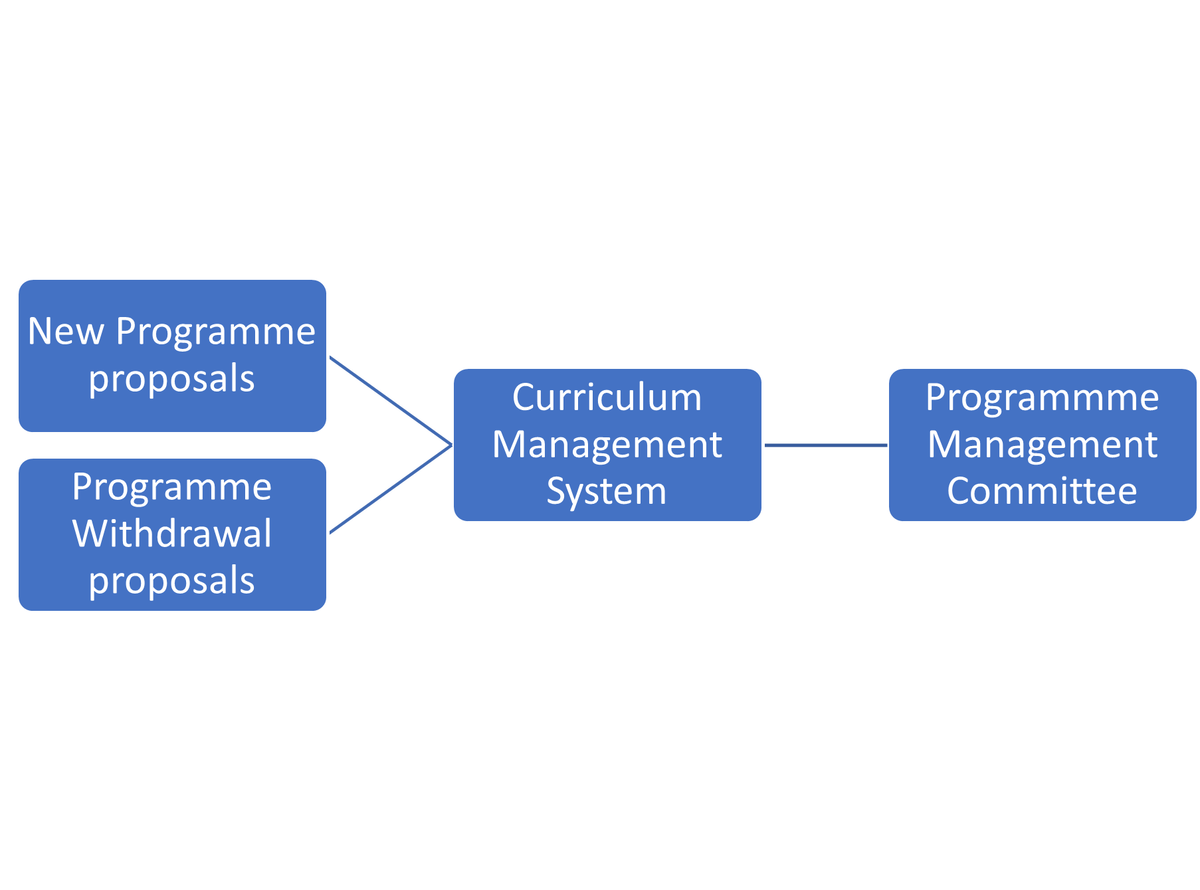
Flowchart: Proposal types that have to be submitted via the central PMC email address
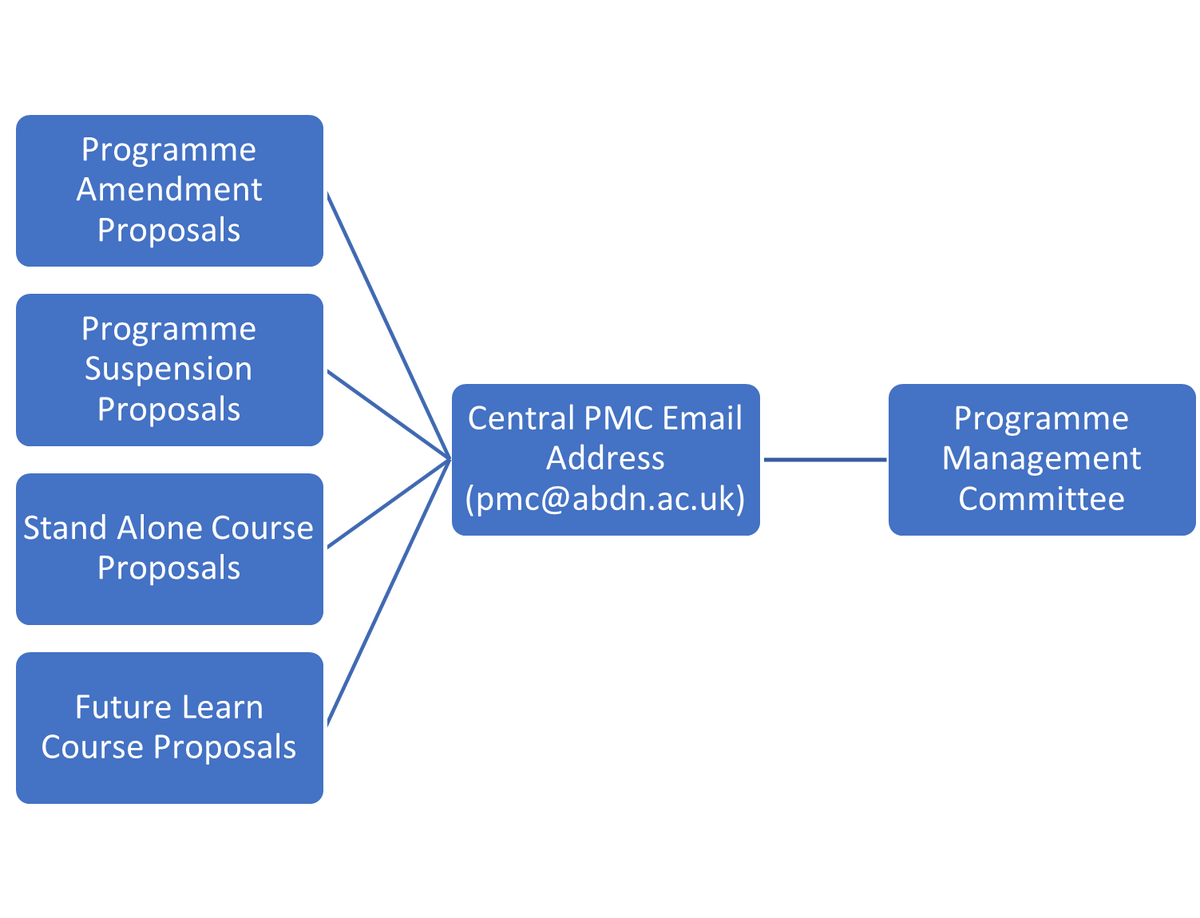
The following sections in this document provide a basic step by step guide regarding the process for each of the main proposal types. If you are unsure about which proposal type and/or process would apply to what you are hoping to do please contact pmc@abdn.ac.uk for advice.
- Curriculum Management System
-
Brief overview of the Curriculum Management System (CMS) in relation to the Programme Management Process:
This section of the webpage provides a brief overview of the Curriculum Management System (CMS). Please note that a separate guidance document, which provides more in-depth information on how to use the CMS, including details on information required in each of the fields in the online form is available here. The login to the CMS is available here.
In this context the CMS is the online platform by which Schools can submit and subsequently track the proposals made to the PMC (and other committees such as the Quality Assurance Committee (QAC)).
The CMS can only be accessed by authorised members of staff within your academic schools. Templates to help you prepare the documentation that your School will require in order to complete the various forms on CMS can be accessed here.
It is important to familiarise yourself with the CMS guidance documents, templates and processes, at least to a basic level, as this system will be used throughout the application process. As stated above the CMS can only be accessed by authorised members of staff and we highly recommend that each school has a nominated person who can submit PMC applications via the CMS. We also recommend that you find out who this nominated colleague is, from your School Administration Manager, in the early stages of development, so that you can speak to them about timelines and the other practicalities of submitting your proposal(s).
Please also note that proposals forms which are only partially completed on CMS will not be considered by the Programme Management Committee. If you think that you are going to miss a submission date for a proposal or require assistance, the School should contact pmc@abdn.ac.uk.
- New Programmes
-
New Programmes
If you wish to create and set up a new degree programme, to be offered by the institution, then you will have to go through the following stages and processes:
Stage 1: Development Consent
The first stage in setting up or launching a new programme is to gain Development Consent. This stage will involve:
- Gathering marketing intelligence (your school marketing team can support you with this), reviewing the opportunities already offered by the institution and its competitors.
- Develop the programme title and outline, generate the keywords for promotion. Noting that this information will be required when your school is submitting its proposal application on the CMS.
- Consider the student visa implications of the programme you wish to create and take these considerations into account when designing your programme. (Please see the tab on this webpage called Guidance/FAQs on Student Visa implication for course/programme design for more information on this aspect of programme design).
- Create an outline business plan, including student numbers, information on potential fee income and a description of the resource requirements* (even if no new resources are required (i.e., the programme will be delivered by existing members of staff utilizing resources already in place). Again, noting that this information will be required when your school is submitting its proposal application on the CMS.
- Please review your School's plans both for the current and future academic years to ensure that your proposal fits in with these.
- By gathering the information described in the three bullet points above and drafting text or documentation (we would recommend using the templates that are available here when doing this), it should make the process of ultimately submitting an application via the CMS smoother.
- Once this initial work has taken place, with appropriate input from colleagues in marketing, finance and others then a form can be completed on the CMS (either by yourself if you have access or by the designated person(s) for your school/department.
- This proposal form will be considered at the next meeting of the Programme Management Committee and if approved you will be granted Development Consent**. This consent will enable you to start working with the relevant colleagues to start the process of promoting the programme and proceed onto the next stages in the New Programme process (as described below).
- If development consent is not granted, then you will be provided with feedback by the Programme Management Committee and will be invited to re-submit your proposal once appropriate changes have been made.
(* Please note regarding resource requirements: If new resources (e.g., staff, facilities, IT equipment, software) are required for a new programme then you must flag these resource requirements, prior to submitting your form (both the Word documentation and the CMS) these must be flagged to the Dean for Portfolio Development and Programme Promotion and the clerk for the PMC before an application is submitted for Development Consent Approval.
If required discussions may have to be held with the relevant bodies (i.e., your School's executive, Human Resources, Estates, IT, SMT and any relevant committees) in order for approval for specific resource requirements to be fully explored.
These conversations should take into consideration the project student numbers included in the Finance template and information in your school plans.
Where there are new resource requirements it should be confirmed - as part of the proposal application - that all of the necessary conversations have take place and that the relevant parties have agreed that resources required are either in place or can be put in place successfully.)
(** Please note regarding Development Consent: If your proposal is successful in being granted Development Consent by PMC then you will receive a confirmation email from the PMC account and your proposal should be approved on the CMS as well. The confirmation email may, contain feedback from the committee, which is unique to your proposal. This feedback will include information on the next steps that be taken regarding the further development of your proposal AND may ask for some additional questions or suggestions from the committee. If having received a successful or an unsuccessful follow-up email from PMC, you are unsure as to the next steps or what it means please contact the clerk to PMC, who will be happy to advise.)
Please note that you must alert the Dean for Portfolio Development and Programme Promotion and the clerk for the PMC (contactable at pmc@abdn.ac.uk) that an application may be incoming at the earliest stage possible. Please also liaise with the Dean and the Clerk throughout the process of developing and submitting your proposal. This will help the PMC to prepare and, if appropriate, for colleagues to help.
Stage 2: Programme Promotion, Quality Assurance and the Planning Process
The second stage, which can be pursued once Development Consent has been granted, consists of three work streams that should as far possible occur concurrently: Programme Promotion, Quality Assurance and the Planning Process.
Please see a brief description of each of these work streams below:
Programme Promotion:
- Working with your School marketing manager, create a marketing plan, draft promotional materials and generate metadata.
- Once the first step has been completed the programme can be enabled for recruitment.
- Once a programme has been enabled there will be ongoing monitoring of search inquiry and engagement activity (e.g., have prospective students contacted the student recruitment team(s) in External Relations about this prospective programme).
Quality Assurance:
- The proposed programme specification and information about new courses involved are submitted to the Quality Assurance Committee (QAC) for approval.
- If necessary, this step may involve discussions between yourself, the School and QAC in order to make any amendments in order to satisfy QAC requirements.
- Once any amendments have been made (if required) then programme and associated courses will be approved by QAC.
Planning Process:
- Confirm the availability of the resource requirements to support programme delivery.
- Integrate the programme business plan into you your School Plan for review.
- Establish a criterion to enable the on-going assessment of programme viability (e.g., in basic terms how many students does the programme need to attract in order to remain viable). For this you will need to think about (and record) what does success for this programme look like? Does this fit and further the aims of my School's plans? Does my proposal take account of the University's 2020-40 strategy?
Stage 3: Final approval from the Programme Management Committee
If a new programme is successful in passing all of the requirements and steps described in Stage 2 then it will come back to the Programme Management Committee for a final approval.
Provided that the proposed programme hasn't been changed in major way and/or no objections are raised by the committee or other key stakeholders then the programme will most likely receive final approval.
Once final approval has been granted offer making can begin and the school can prepare for the delivery of the programme.
It is important to note that a range of your colleagues, both in your school and centrally, can help you through-out this process, in order to ensure that your programme is released and successfully delivered. If you have any questions, please contact the PMC clerk at pmc@abdn.ac.uk.
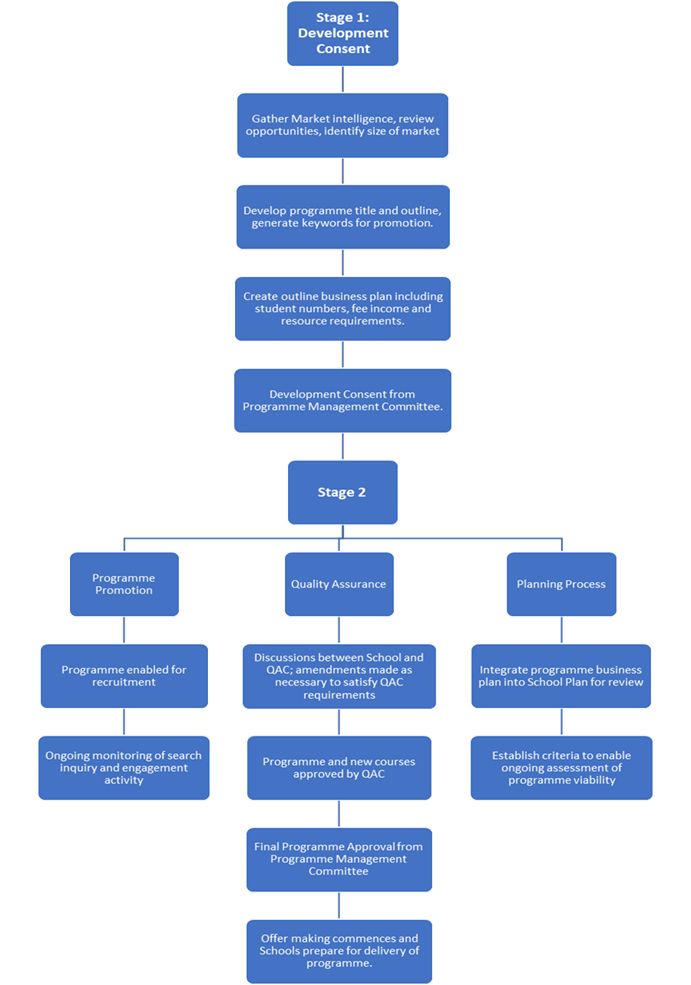
A copy of the guidance document for the New Programmes can be downloaded in PDF format here.
A copy of the New Programme / Development Consent template can be downloaded here.
Please contact the clerk to Programme Management Committee at pmc@abdn.ac.uk if you have any questions.
- Programme Withdrawals
-
Programme withdrawals
If you wish to propose that a programme is withdrawn, then you will have to go through the following process:
- Gather the necessary information, consulting with the relevant colleagues, and complete a Programme Withdrawal form via the CMS.
- We highly recommend that you complete a draft Programme Withdrawals form, out with the CMS, before attempting a submission. A template for this is available here. This may help with gathering all the requisite information before it is input into the CMS.
- Please check, with the appropriate colleagues in your school, that the programme you wish to have withdrawn is available on the CMS. If it is not available then you will need to complete and submit a form template to pmc@abdn.ac.uk.
- Please note that you must liaise with the Dean for Portfolio Development and Programme Promotion and the clerk for the PMC, in the early stages of programme withdrawal, so that they are aware that it will be incoming and can help (if required).
- Once submitted via the CMS the completed Programme Withdrawal proposal will then be considered by the PMC at its next meeting.
- If the proposal is approved by the PMC, then the school can begin the process of withdrawing the programme, working with the relevant departments.
- If the proposal is not approved by the PMC (e.g., the committee may ask for more information or it may be too late to withdraw) then you will receive feedback for the clerk of the committee and the offer of support to take the proposal forward by the Dean for Portfolio Development and Programme Promotion.
Programme Withdrawal Flowchart (Basic Overview)

Programme Withdrawal Flowchart (Basic Next Steps):
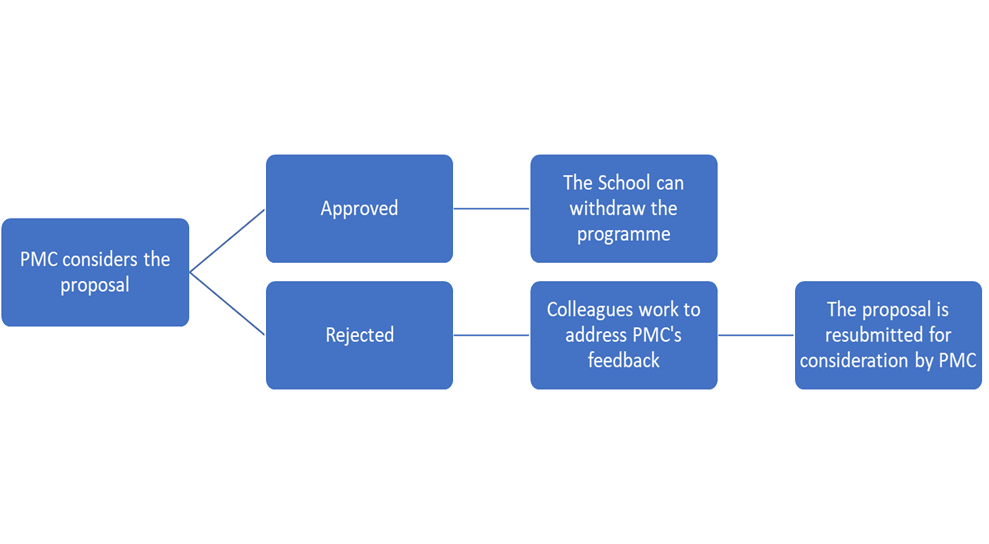
A copy of the guidance document for Programme Withdrawals can be downloaded in PDF format here.
A copy of the Programme Withdrawals form template can be downloaded here.
Please contact the clerk to the Programme Management Committee, at pmc@abdn.ac.uk, if you have any questions.
- Programme Suspensions
-
Programme Suspensions
If you wish to propose that a programme is suspended, then you will need to go through the following process.
- We highly recommend that you complete a draft Programme Suspensions form, a template for which is available here. This may help you to complete the final form later in the process.
- Please note that you must liaise with the Dean for Portfolio Development and Programme Promotion and the clerk for the PMC, in the early stages of developing a programme suspension proposal, so that they are aware that it will be incoming and can help (if required).
- Once you have gathered the necessary information and consulted with the relevant colleagues you (or the designated colleague in your school) would complete a Programme Suspensions form and submit it via the central PMC email address.
- The Programme Suspension proposal will be considered by PMC as long as everything is in place and submitted in a timely manner.
- If the proposal is approved by the PMC, then the school, working with the relevant departments, can begin the process of suspending the programme.
- If the proposal is not approved by the PMC (e.g., the committee may ask for information) then you will receive feedback for the clerk of the committee and the offer of support to take the proposal forward by the Dean for Portfolio Development and Programme Promotion.
Programme Suspension Flowchart (Basic Overview)
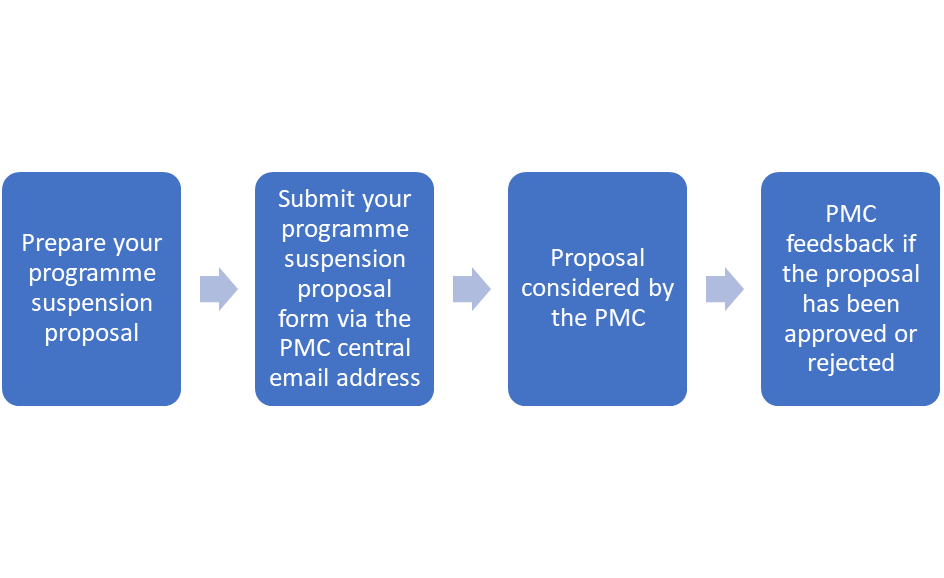
Programme Suspension Flowchart (Next Steps)
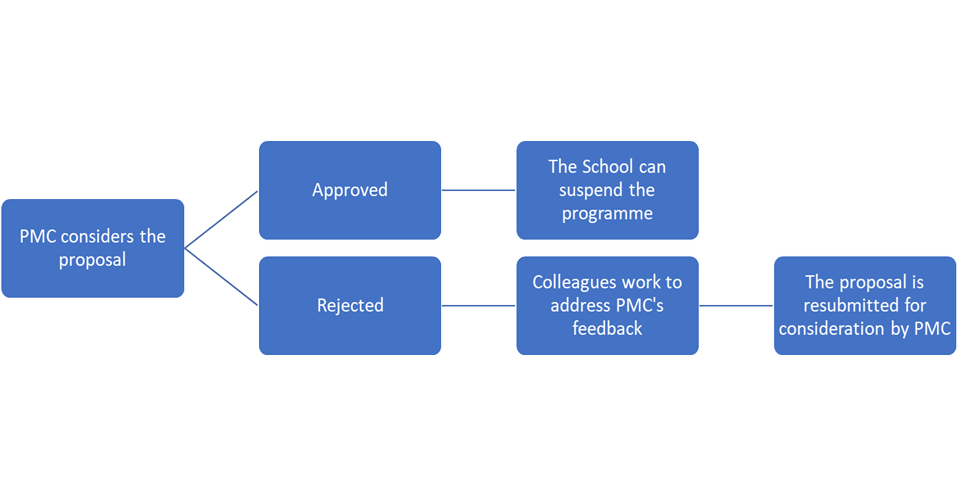
A copy of the guidance document for Programme Suspensions can be downloaded in PDF format here.
A copy of the Programme Suspensions form template can be downloaded here.
Please contact the clerk to the Programme Management Committee at pmc@abdn.ac.uk if you have any questions.
- Programme Amendments
-
Programme Amendments
If you wish to propose that amendments or changes are made to an existing programme (regardless of if the programme is currently running), then you will need to go through the following process.
- We highly recommend that you complete a draft Programme Amendment form, a template for which is available here. This may help you to complete the final form later in the process.
- Please note that you must liaise with the Dean for Portfolio Development and Programme Promotion and the clerk for the PMC, in the early stages of developing a programme amendment proposal, so that they are aware that it will be incoming and can help (if required).
- Once you have gathered the necessary information and consulted with the relevant colleagues you (or the designated colleague in your school) would complete a Programme Amendment form and submit it via the PMC central email address.
- The Programme Amendment proposal will be considered by the PMC, providing, everything is in place, and submitted in a timely manner.
- If the proposal is approved by the PMC, then the school, working with the relevant departments, can begin the process of amending the programme.
- If the proposal is not approved by the PMC (e.g., the committee may ask for information) then you will receive feedback for the clerk of the committee and the offer of support to take the proposal forward by the Dean for Portfolio Development and Programme Promotion.
- Please note that you will need to consider a number of timeframes when developing a Programme Amendment proposal. For example there maybe cut off points for making substantial changes to a programme due to marketing considerations and/or recruitment concerns.
Programme Amendment Flowchart:
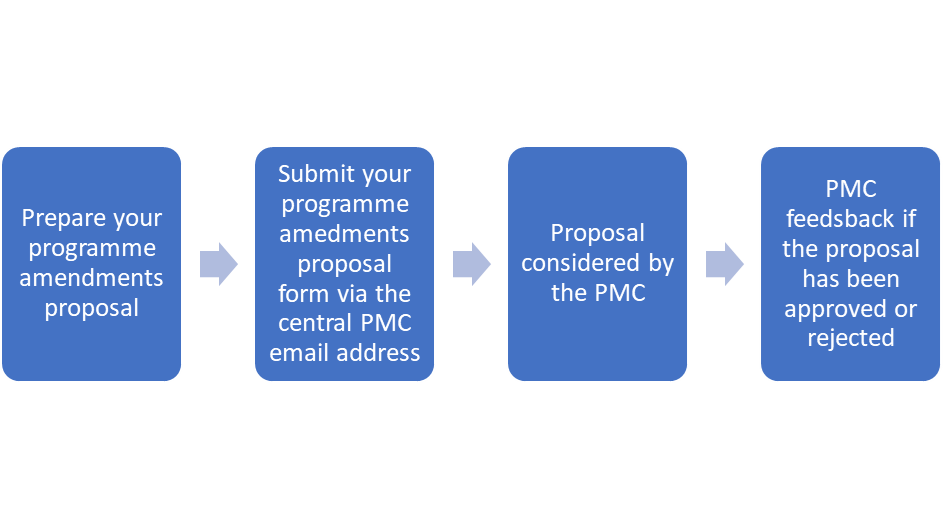
A copy of the guidance document for Programme Amendments can be downloaded in PDF format here.
A copy of the Programme Amendment form template can be downloaded here .
Please contact the clerk to the Programme Management Committee at pmc@abdn.ac.uk if you have any questions.
- Stand Alone Short Courses
-
Stand Alone Short Courses
New Stand-Alone Short Courses no longer require approval from the Programme Management Committee (PMC).
This includes both entirely new courses and those which are offered as part of an existing programme, which an Academic School(s) wish to offer on a stand-alone basis.
Approval is still required from the Quality Assurance Committee (QAC).
Also, when developing a proposal for a new Stand-Alone course (or to offer an existing course on a Stand-Alone basis) input and advice should be sought from the Marketing team, Online Education team, the School's Accountant (Finance Team) and Student Immigration & Compliance Team.
Please contact the clerk to the Programme Management Committee at pmc@abdn.ac.uk if you have any questions.
- FutureLearn Courses
-
FutureLearn Courses
If you wish to propose that a new FutureLearn course is offered by the University, then you will need to go through the following process:
- Please review the form for new FutureLearn courses, that has been created by the Online Team, which is available here.
- Liaise with the Online Team, and other relevant parties, as required.
- Please also liaise with the Dean for Portfolio Development and Programme Promotion and the clerk for the PMC, in the early stages of proposal development, so that they are aware that it will be incoming and can help (if required).
- Once the necessary paperwork has been completed, please submit it to pmc@abdn.ac.uk for consideration at the next meeting of the Programme Management Committee.
- If the proposal is approved by the committee, then you can proceed to take the development and delivery of the course forward with the Online Team.
- If the proposal is not approved by the committee, then you will receive feedback from the clerk of PMC and the offer of support to take the proposal forward by the Dean for Portfolio Development and Programme Promotion.
FutureLearn Courses Flowchart (Basic Overview):
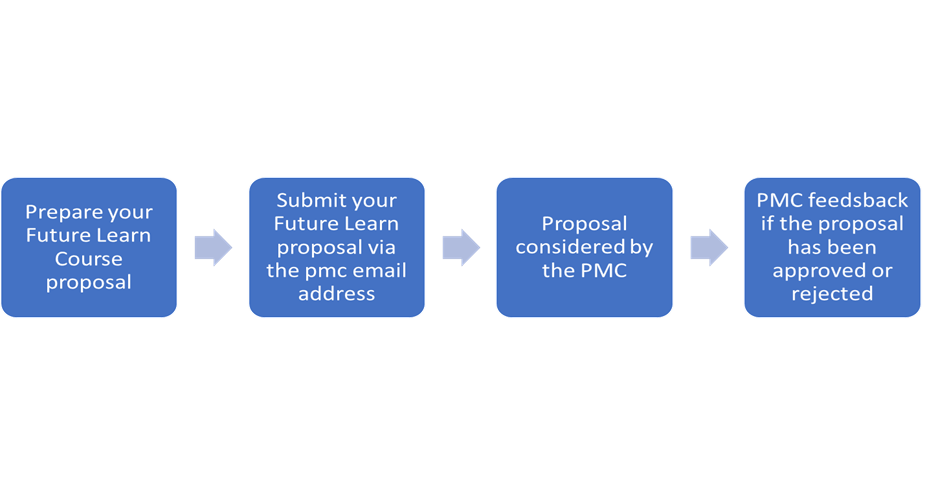
FutureLearn Courses Flowchart (Next Steps):
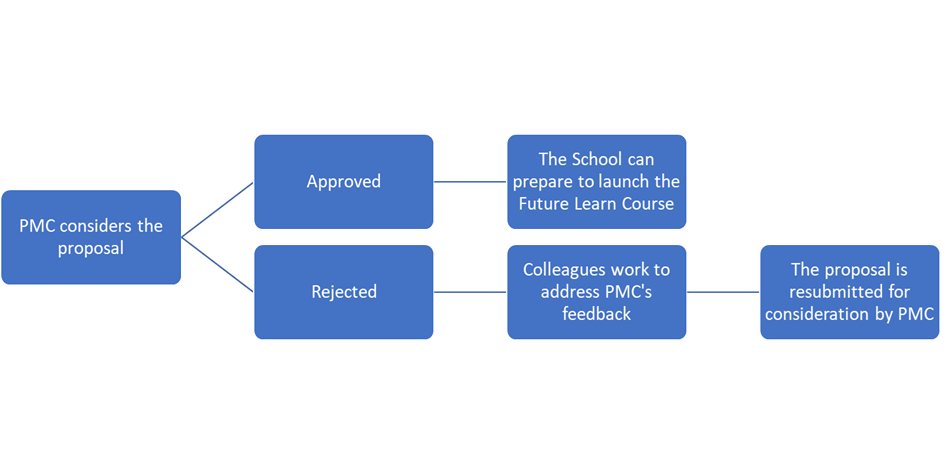
A copy of the guidance document for FutureLearn Courses can be downloaded in PDF format here.
A copy of the FutureLearn Course form template can be downloaded here.
Please contact the clerk to the Programme Management Committee at pmc@abdn.ac.uk if you have any questions.
- Marketing Information
-
Many of the proposal types, that will be considered by the Programme Management Committee, will require marketing information. Even when marketing information is not an essential requirement of for a proposal it advised that you keep your school's marketing team aware of your plans. Colleagues from the Marketing Team stand ready to assist you with Programme Management queries.
School
Marketing Manager
Marketing Officer
Business
Law Ray Addison Fiona Jardine DHP, LLMVC & Education Ray Addison Engineering, NCS, Geosciences, Social Sciences
MMSN Jayne Laird Susan Bryce Biological Sciences, Psychology
Online Education Brian Hussey Lisa Campbell - Guidance/FAQs on Student Visa implications for course / programme design
-
Guidance/FAQs on Student Visa implications for course/programme design
The criteria used by the Home Office to determine if an applicant is eligible for a Student Visa (formerly a Tier 4 visa) includes factors relating to the duration, level and composition of the programme and the amount of time spent studying in the UK as opposed to outwith then UK.
This of course has implications for the design of academic provision, and the attractiveness of a programme to an international fee-paying student who would normally require a Student Visa. The set of Frequently Asked Questions below have been developed to assist Schools in taking these different factors into account.
When should I seek further guidance about my new programme?
The Home Office allow institutions to recruit students to full-time degree level programmes that are taught fully on-campus, and students may apply for a Student visa in order to travel to the UK to study on such a programme.
Variations on the above can be permitted, if the information below is also taken into consideration. If you are in any doubt the course should be discussed with the Student Immigration Compliance Team to ensure that additional Home Office requirements can be built into the course, (if you will recruit international students).
You should therefore check if you are developing a programme which will be:
- below SCQF 9
- involve a work placement
- involve teaching anywhere other than the University Campus
- will include periods of fully online study
- will include unusual vacation periods/unusual pattern of attendance
- Any programme taught in multiple parts where a qualification is awarded at each part
How can the University ensure that a student successful obtains a Student Visa?
The Visa application and issuance process is managed by the Home Office and the University has no role in this process.
Prior to a student applying for a Visa they need to have been issued with a Certificate of Acceptance for Studies (CAS) by the university at which they are intending to study. Because the Home Office monitors the number of CAS we issue, and the number that are used in an unsuccessful Visa application, we will only issue CAS in cases where we think that a Visa application will be successful.
The School is developing a postgraduate taught programme that involves courses studied fully online and courses studied fully on-campus; will a Student Visa allow this type of study?
Although the Home Office has accepted Student Visa holders studying online for part of the time during the pandemic, there is no confirmation that it will continue to take this approach.
It is possible that the Home Office would continue to accept that those with a Student Visa should be able to attend classes offered in different modes, for example small classes in person and large classes/lectures online. However, it seems unlikely that a Student Visa would ever be approved for a student who would be studying entirely online for a block of time, and entirely on campus for another block of time.
Are there other visa options if a Student Visa doesn't allow for periods of online/on-campus study?
An individual registered on a distance learning programme can stay in the UK for up to six months, , by applying for a Standard Visitor visa. The Standard Visitor visa is also an option for short programmes that can be completed within 6 months. Students can visit the following webpage for an application guide; Immigration and Student Visas | Students | The University of Aberdeen (abdn.ac.uk)
However, this option may be unattractive to international students as studying in the UK on a Standard Visitor Visa would mean that they were not then eligible for the Graduate route visa. The Graduate visa gives a student permission to stay in the UK for at least two years.
Standard Visitors cannot work in any capacity, including unpaid work and work that forms part of the programme (such as a work placement or internship)
Finally, if a programme involved multiple short-term periods on-campus at different times, and therefore multiple short-term Standard Visitor Visa applications, this increases the risk of visa refusal as every new application has the potential to be refused, and refusals can be made on the basis the Home Office believes the trips to the UK are “frequent and successive” Those on a Standard Visitor visa should be spending the majority of time outside the UK.
The School would like to offer a programme with a work placement
The Home Office allow Student/Tier 4 visa holders to undertake a work placement provided all the following requirements are met:
- The work placement must be an “integral” part of the programme of study
- The work placement must be assessed within the programme. The duration of the placement should be broadly proportionate to the value of this assessment, e.g., a UG one year work placement should be equivalent to the credits that could be earned during a full-time year of study)
- attendance must be monitored by the placement provider and passed to the School Administration Team to be recorded on the student's file
- The School Administration Team must provide the Student Immigration Compliance Team with the names on any student taking a work placement, along with the placement start and end date, location and placement contact person, as this information must be reported to the Home Office
Additionally, the course must be at degree level and work placement must not be more than 50% of the duration of the course as studied in the UK on a Student/Tier 4 visa. If students have not studied their full course with the University of Aberdeen in the UK, please contact the Student Immigration Compliance Team to discuss. If there is a statutory requirement that the work placement is more than 50% of course duration, please contact the Student Immigration Compliance Team. If students are studying below degree level and are required to undertake a work placement, please contact the Student Immigration Compliance Team.
The School would like to offer a programme with an unusual pattern of attendance or unusual vacation periods
The Home Office do not stipulate attendance requirements for programmes at degree level and above, but we must ensure we are able to effectively monitor attendance on all programmes of study, and study requirements should be consistent with similar programmes offered by other institutions. We would encourage you to contact the Student Immigration Compliance Team to discuss any unusual patterns of attendance on new programmes. Below degree level the Home Office do have minimum hours of attendance per week (15 hours, Monday to Friday 8am-6pm).
Vacation periods must be reasonable, and we should aim for these to be consistent with programmes offered at other institutions. The Home Office do not offer specific guidance here but provide the following warning “Disproportionately long vacations may be considered immigration abuse”, so caution is advised
The School would like to offer a programme where teaching in conducted on a non-campus location
The Home Office do not permit any teaching to be conducted at any location other than the University of Aberdeen main campus, and the locations listed below. The only exception is a temporary location, the Home Office give an example of a field trip. Caution is strongly advised when considering if a teaching location is “temporary” and this should be discussed with the Student Immigration Compliance Team. If teaching is to take place at other locations (including joint teaching with other institutions, research institutes or private providers) we must first seek the permission from the Home Office and no teaching/supervised research can take place at this location until the Home Office have provided their permission.
Permitted Teaching Locations
- Foresterhill Health Campus - Including Aberdeen Royal Infirmary and associated hospitals
- The Rowett Institute of Nutrition and Health
- Oceanlab
- Bettyhill Field Station
- Lighthouse Field Station
- Aberdeen Sports Village
- Royal Cornhill Hospital
- Highland Medical Education Centre, Raigmore Hospital
We also have a number of teaching partnerships with other UK universities and Study Group, however these arrangements are for specific programmes and any new programme should be discussed with the Student Immigration Compliance Team.
The School would like to offer an entry point at PgCert or PgDip level, with the option of progressing on to a Masters degree should academic progress be satisfactory. Can a student with a Student Visa be offered this option?
The CAS we issue to support the Student's Visa application has to include the intended course dates, and if a student is intending to register for a PgCert or PgDip. We cannot issue a CAS that would cover the duration of a one-year Masters programme if a student is only accepted onto the PgCert or PgDip.
We strongly recommend that CAS are not offered for the PgCert or PgDip if the intention is for the student to move to the Masters level on successful completion. The reality of the immigration complexity of managing the progression, means that student may be unable or unwilling to obtain a new visa, even if they meet all academic requirements for the progression.
If students are offered a place on a PgCert or PgDip, they will be granted a Student visa covering the duration of this course and they must apply for a visa extension for the new course. They will only be able to do so once we are able to confirm the student has successfully completed and the date they will be awarded the PgCert or PgDip. It is possible that this will not happen before the student's visa expires, meaning the student would need to leave the UK and therefore causing significant academic disruption. If the student will not receive a PgCert or PgDip award at all (for example if this is treated as an integrated course where no qualification is awarded until they complete the Masters) then it is simply not possible to make a visa application within the UK as there is no Home Office exemption for this type of integrated course. Returning home to make a visa application is possible, but this will cause significant academic disruption. In all situations students will need to meet the considerable cost of the additional visa application, plus flights in and out of the UK, which is not attractive. Additionally, the visa extension for the Masters will result in a visa that is very short and will therefore find themselves ineligible for the Graduate route as well as not being able to attend in-person graduation without applying for another visa.
For any queries related to student immigration and visa issues please contact the Student Immigration Compliance Team Team at immigration@abdn.ac.uk.
- Gaelic Language Plan and Programme Development
-
The University of Aberdeen, like many public authorities across Scotland, has a statutory duty to develop and implement a Gaelic Language Plan. The central purpose of the Plan is to increase the learning and use of Gaelic as well as promoting a positive image of Gaelic. You may have seen the impacts of the plan around the campus (e.g., in our dual language signage) or on our website. One of the most important aspects of the University's plan is think about how we can integrate Gaelic into our learning and teaching activities. For example, when developing a new Programme, at either UG or PG level, would it be beneficial to include a Gaelic language focused course in the programme? Or could you, in the course of your duties and the delivery of teaching, support the University's plan?
More information on the University's Gaelic Language Plan: Gaelic Language Plan 2019-2024
You can contact the University's Equality, Diversity and Inclusion team, who administer the Gaelic Language Plan, for more info: ceit.macintosh@abdn.ac.uk.
- Contacts
-
Please let both the Dean for Portfolio Development and Programme Promotion and the clerk for the Programme Management Committee know if you are planning on making any type of proposal to the Programme Management Committee. This helps with both committee management and portfolio planning.
If you have any general questions about the Programme Management Process and the Committee, please contact the clerk at pmc@abdn.ac.uk.
Please see a note of the relevant contact details below:
General Queries
Dean for Portfolio Development and Programme Engagement
Professor Anne-Michelle Slater
